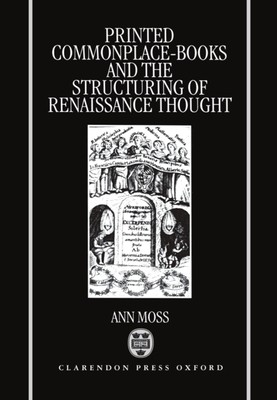
- We will send in 10–14 business days.
- Author: Ann Moss
- Publisher: Clarendon Press
- ISBN-10: 0198159080
- ISBN-13: 9780198159087
- Format: 16.2 x 24 x 2.6 cm, hardcover
- Language: English
- SAVE -10% with code: EXTRA
Printed Commonplace-Books and the Structuring of Renaissance Thought (e-book) (used book) | bookbook.eu
Reviews
Description
Commonplace-books were the information-organizers of Early Modern Europe, notebooks of quotations methodically arranged for easy retrieval. From their first introduction to the rudiments of Latin to the specialized studies of their later years, the pupils of humanist schools were trained to use commonplace-books. The common-place book mapped and resourced Renaissance culture's moral thinking, its accepted strategies of argumentation, its rhetoric, and its deployment of knowledge. In this study, Ann Moss investigates the evolution of the commonplace-book from its medieval antecedents, through its humanist realization, its later printed manifestations, and, finally, to its gradual decline in the seventeenth century.
EXTRA 10 % discount with code: EXTRA
The promotion ends in 18d.17:52:36
The discount code is valid when purchasing from 10 €. Discounts do not stack.
- Author: Ann Moss
- Publisher: Clarendon Press
- ISBN-10: 0198159080
- ISBN-13: 9780198159087
- Format: 16.2 x 24 x 2.6 cm, hardcover
- Language: English English
Commonplace-books were the information-organizers of Early Modern Europe, notebooks of quotations methodically arranged for easy retrieval. From their first introduction to the rudiments of Latin to the specialized studies of their later years, the pupils of humanist schools were trained to use commonplace-books. The common-place book mapped and resourced Renaissance culture's moral thinking, its accepted strategies of argumentation, its rhetoric, and its deployment of knowledge. In this study, Ann Moss investigates the evolution of the commonplace-book from its medieval antecedents, through its humanist realization, its later printed manifestations, and, finally, to its gradual decline in the seventeenth century.


Reviews